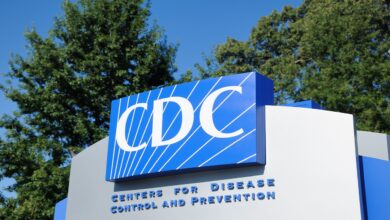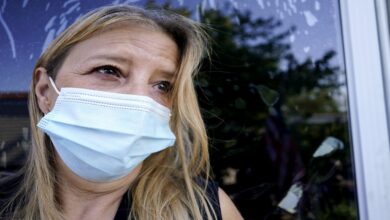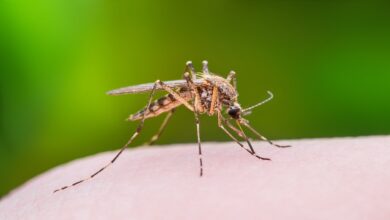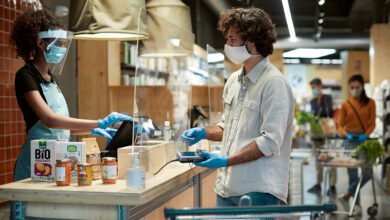Mental health experts warn of isolation’s devastating effects amid pandemic

[ad_1]
The effects of isolation on mental health can be severe
95-year-old Rita Thomas was forced to isolate alongside her fellow nursing home residents amid the pandemic. Without the ability to see her loved ones or socialize with others, her health quickly declined. Eventually, she lost the will to carry on.
At her 95th birthday party in February of 2020, Rita Thomas was all smiles. Her daughter, Nan Thomas, said it was a perfectly executed surprise for her mother, as about 30 of her closest friends showed up to celebrate the big day.
But, if every single one of Rita’s friends had arrived, 30 seats would not have even come close to cutting it.

Rita Thomas (right) celebrating her 95th birthday with friends and loved ones in February of 2020 (Photo courtesy of the Thomas family).
“As a child, I was a little bit embarrassed at times because my mother acted like she knew everyone she saw. She talked to everyone,” Nan Thomas told Fox News. “She loved life. She loved people.”
A true socialite whose mind remained sharp as a tack throughout her entire life, she could constantly be found mingling with friends and playing card games or bingo at her assisted living facility.
But in March, everything changed. As the coronavirus hit, nursing homes around the country closed their doors to general visitation, meaning Rita’s family was unable to see her. The best they could do was talk to her by phone through her window.

Rita Thomas (pictured) speaking to loved ones on the phone while in isolation (Photo courtesy of the Thomas family).
“My sister and I were both telling her ‘it’s temporary, mom. This is to protect you, it’s temporary. You will not be locked down very long, it will pass’ and she was ok.”
But “temporary” became indefinite. Eventually, the card games stopped, the bingo games were no more, and Rita was forced to eat all three meals a day in her own room.
Without social interaction and the ability to see her loved ones, Rita’s health began to decline rapidly.
“We could hear it in her voice, she was getting desperate,” said Thomas, adding that everything just seemed to get worse. “[Even with] me, who was going to her window to talk to her every weekend, my mother could no longer raise the blinds, she could no longer answer the phone so I could talk to her through the window. She forgot how to dial the phones, she forgot to turn on and off her TV.”
By the time August came around, things looked dire. Nan arrived at Rita’s facility for a drive-through parade to wave through the car window and see her mother from a distance, but what she saw was unforgettable.
“I saw this woman who was pastier than I am,” explained Thomas, fighting back tears. “Her hair was long and the way she would have hated. And she was skin and bones. And she was just standing there. She would put her hand up to wave, but it was like it was a shell. It wasn’t even my mother, it was someone I didn’t even recognize.”

Photo of Rita Thomas (center) taken during her assisted living facility’s drive-thru in August (Photo courtesy of the Thomas family).
Unbeknownst to Thomas at the time, her mother had penned a letter to her grandson. While normal and heartfelt in most aspects, one chilling section stood out, reading in part: “I’d give anything to see [my family], at least once more, but not at this change. Trying to decide if I should go.”
![The letter Rita Thomas wrote to her grandson, which reads in part: "I’d give anything to see [my family], at least once more, but not at this change. Trying to decide if I should go."](https://a57.foxnews.com/static.foxnews.com/foxnews.com/content/uploads/2021/01/640/320/20210122_135840.jpg?ve=1&tl=1)
The letter Rita Thomas wrote to her grandson, which reads in part: “I’d give anything to see [my family], at least once more, but not at this change. Trying to decide if I should go.”
“And then she finally made the decision ‘I don’t want to live,'” explained Thomas. “She told my sister, ‘I decided I’m going to stop eating because I can’t do this anymore.’ And, she did, that was the only control my mother had: whether she would live or die.”
Rita passed in September of 2020 while lying in Thomas’s living room. To Thomas, the cause of death was self-evident.
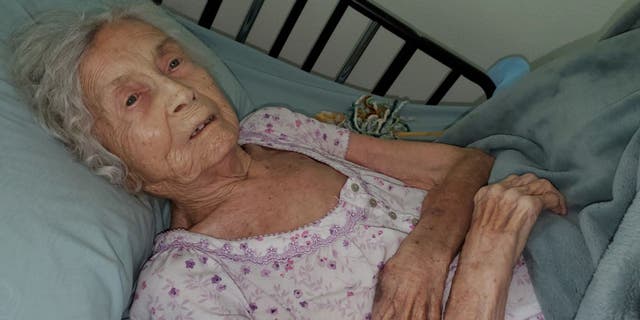
Rita Thomas (pictured) just days before passing away in September of 2020 (Photo courtesy of the Thomas family).
“My mother died from being isolated,” said Thomas. “That’s what killed her, was isolation.”
The reality is, Rita Thomas’ story of isolation is not a lone case. The Mental Health Association of Central Florida says the pandemic has had widespread psychological consequences, with isolation playing a particularly devastating role.
“Even the healthiest, happiest person has been affected,” Marni Stahlman, the CEO and President told Fox News. “As human beings, we are not set up to be individuals to exist on our own island.”
Stahlman says the issue is not exclusive to the elderly. With millions of Americans still working from home, office camaraderie and socializing are missing from many adult lives. Even children, some of whom are unable to return to school in-person to see their friends, are feeling the heavy burden.
A study released by the Henry J. Kaiser Family Foundation (KFF) in August found that 47% of adults sheltering in place say Coronavirus has had a negative impact on their mental health. The impact was deemed to be “major” in almost half of those in that group.
Stemming from that, rises in trouble eating, difficulty sleeping, and depression were reported. 40.1% of those surveyed in July attested to symptoms of anxiety and/or depressive disorder as a result of the pandemic.
Stahlman says even as the COVID-19 vaccine continues to be distributed, the mental health effects remain prevalent.
“While we are now working to meet the medical community needs for the disease, the psychological impacts are much more far-reaching,” said Stahlman.
With the pandemic still posing a threat, in-person counseling is effectively off the table at many facilities, and groups like the Mental Health Association of Central Florida have been operating by phone and through video calls to work with those who need help.
Stahlman, however, says the shift to virtual has yielded a surprising trade-off. On the one hand, it can be more difficult to connect with someone in need while not face-to-face, but on the other hand, it allows them to reach more people — some of whom may not have been inclined to seek help in-person before.
“We’re really pivoting to try and find more opportunities to when the client needs us to be available, and that has opened up an opportunity for more people to get access,” explained Stahlman.
Still, Stahlman stresses that especially now, it is critically important to keep one’s friends and family close, avoid letting them become isolated, and get them help if necessary.
Thomas chose to share Rita’s story for this exact reason. Despite her best efforts for months, she couldn’t get Rita out of isolation until it was too late. Assisted living facilities in Florida were not re-opened to the general public until October — over a month after Rita had passed. According to AARP, most facilities nationwide are now open with some level of restrictions.
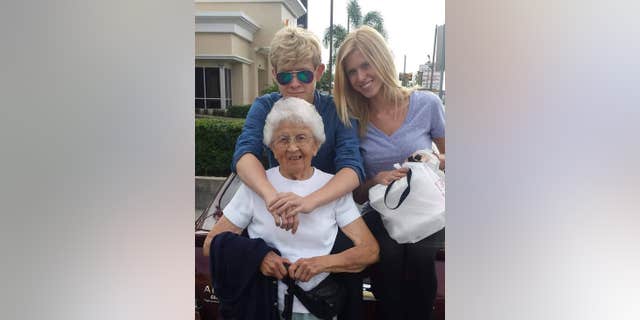
Rita Thomas (center) pictured with her grandson, Thomas McInnes (left), and granddaughter Cat McInnes (right) (Photo courtesy of the Thomas family).
Thomas hopes that the public can learn from Rita’s story, and realize that being safe from COVID-19 in isolation is not at all safe.
“Isolation is harmful to anyone who doesn’t want it, and my mother hated it,” said Thomas. “Stop saying that ‘we’re protecting them’ because you’re not.”
“We would have rather had my mother die from COVID. It was such a loss. It was such an ugly loss. It was not a pretty death. It was a sad death that never should have happened.”
[ad_2]
Source link


